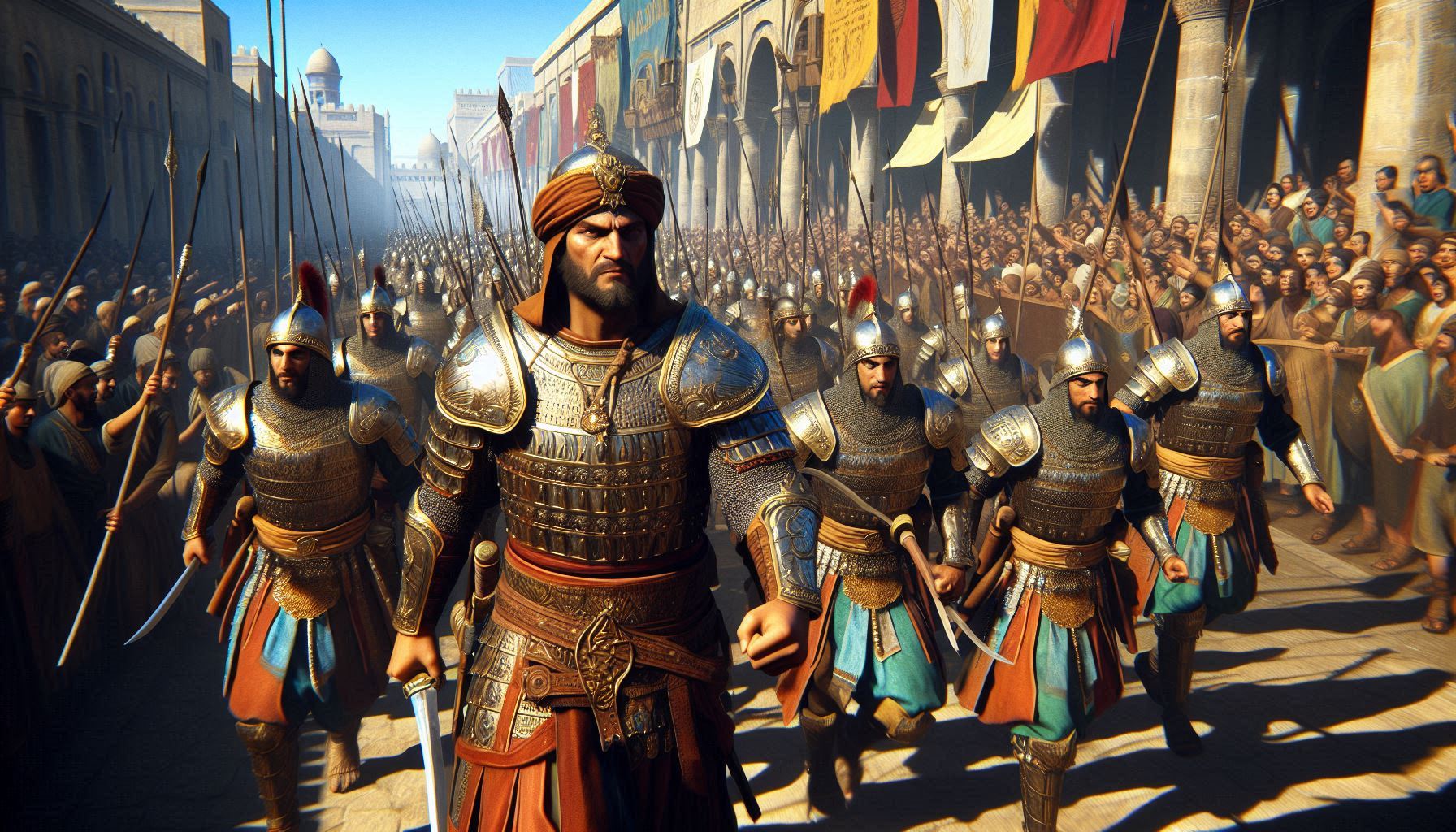“Face to Face” pays tribute to one of history’s most important battles: the Battle of Ain Jalut (1260 CE). This clash marked a turning point in the expansion of the powerful Mongol Empire and highlighted the resilience of the Mamluk Sultanate of Egypt. Through this song, we honor the bravery of the Egyptian Mamluks who stood against overwhelming odds and emerged victorious, protecting not only Egypt but the broader Muslim world.
The Mongol Invasion: A Storm from the East
By the mid-13th century, the Mongol Empire was feared across the world. Under the leadership of Hulagu Khan, a grandson of Genghis Khan, the Mongols had devastated entire cities and regions. In 1258, they captured Baghdad, the heart of the Islamic world, marking the end of the Abbasid Caliphate. Baghdad’s fall was a monumental disaster—one of the wealthiest, most culturally rich cities was reduced to ashes.
After Baghdad, the Mongols continued westward, targeting Syria and Palestine, with Hulagu aiming to extend Mongol control even further. His ultimate goal: Egypt. The Mongols were seemingly unstoppable, and as they approached Egyptian borders, their reputation alone struck fear in the hearts of nations. It seemed that no one could stand against them.
A Bold Response: Qutuz’s Defiance
As the Mongols advanced, Hulagu Khan sent envoys to Cairo with a chilling message: Egypt should submit to Mongol rule, or face destruction. This was the standard Mongol approach—demand surrender, and if refused, raze the city to the ground.
However, the newly crowned Sultan Saif ad-Din Qutuz was not a man who would bow to threats. Instead of submitting, Qutuz chose a path of defiance. In a dramatic move that shocked both his allies and enemies, he executed the Mongol envoys and sent their heads back to Hulagu as a message: Egypt would not be intimidated. This act of boldness sent a clear signal that Qutuz was willing to fight, despite the Mongols’ terrifying reputation.
Preparing for the Battle of Ain Jalut
With the Mongol threat looming, Qutuz knew that waiting for the Mongols to invade Egypt would be a mistake. Instead of adopting a defensive posture, Qutuz and his brilliant general, Baybars, decided to meet the Mongols head-on. They understood that Egypt’s survival depended on taking the initiative and facing the threat directly, rather than waiting passively for the Mongols to invade.
The Mamluks marched north to meet the Mongols in Ain Jalut, a strategic location in modern-day occupied Palestine. This battle would be crucial not only for Egypt but for the future of the entire region. Qutuz and Baybars united their forces and prepared their soldiers, knowing that they were facing a seemingly invincible enemy.
The Battle of Ain Jalut: Strategy and Victory
The Battle of Ain Jalut took place in September 1260 and would become one of the most significant battles in history. The Mamluks knew they could not defeat the Mongols through brute force alone, so they relied on clever tactics.
As the song describes, “They feigned retreat, they lured them in.” The Mamluks, under Baybars, pretended to retreat, drawing the Mongols into a vulnerable position. Believing they had the upper hand, the Mongols chased after the Mamluk forces, only to fall into a carefully planned trap.
At the right moment, the Mamluks launched a fierce counterattack, taking the Mongols by surprise. The Mongol commander, Kitbuqa, who was leading Hulagu’s forces in his absence, fought valiantly but was eventually overwhelmed. He was captured and executed, sealing the fate of the Mongol army.
For the first time, the Mongols experienced a major defeat. This marked a historic moment, as no other force had managed to decisively beat the Mongols in open battle. As the song states, “For the first time, they knew defeat, by Egypt’s hand, they faced retreat.”
The Aftermath: A New Dawn for Egypt
The victory at Ain Jalut was more than just a military triumph; it was a moment that changed the course of history. The Mongols, who had terrorized Asia and the Middle East for decades, were stopped in their tracks. The Mamluk Sultanate, under the leadership of Qutuz and Baybars, not only protected Egypt but also halted the Mongol invasion of the entire Muslim world.
The battle also solidified the Mamluks’ reputation as a powerful military force, able to stand up to even the mightiest of empires. The song captures the significance of this moment, “The deserts speak of courage bold, of battles won and legends told.”
Legacy of Ain Jalut
The Battle of Ain Jalut remains one of the most celebrated moments in Egyptian and Islamic history. It demonstrated that even the most formidable of enemies could be defeated with bravery, unity, and smart tactics. “Face to Face” honors this legacy, celebrating the courage of those who stood against the Mongol tide and protected their homeland.
The song’s final lines, “Egypt rises, face to face, against any threat, in any place,” highlight Egypt’s proactive spirit. Like at Ain Jalut, Egypt does not wait passively for danger to come; instead, it meets threats directly and decisively. The Mamluks didn’t wait behind their borders—they marched out to meet the Mongols head-on, just as the song encourages Egypt to do against any challenge it may face in the future.
This victory at Ain Jalut is a testament to the power of standing firm and taking action in the face of overwhelming odds, and that legacy continues to inspire today.

